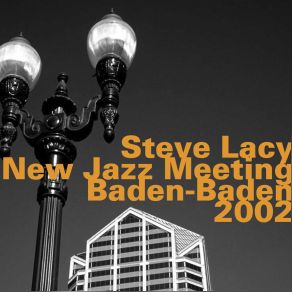Steve Lacy: New Jazz Meeting, Baden-Baden 2002
Download links and information about Steve Lacy: New Jazz Meeting, Baden-Baden 2002 by Steve Lacy. This album was released in 2003 and it belongs to Jazz genres. It contains 6 tracks with total duration of 58:32 minutes.

|
|
|---|---|
| Artist: | Steve Lacy |
| Release date: | 2003 |
| Genre: | Jazz |
| Tracks: | 6 |
| Duration: | 58:32 |
| Buy it NOW at: | |
| Buy on iTunes $9.99 | |
Tracks
[Edit]| No. | Title | Length |
|---|---|---|
| 1. | Differenz / Wiederholung 1.2 (feat. Peter Herbert, Wolfgang Reisinger, Christof Kurzmann & Bernhard Lang) [Remix 6.8] | 8:50 |
| 2. | Differenz / Wiederholung 1.2 (feat. Philip Jeck & Bernhard Lang) [Remix 7.4] | 6:17 |
| 3. | Differenz / Wiederholung 1.2 (feat. Peter Herbert, Wolfgang Reisinger & Christof Kurzmann) [Remix 10.2] | 15:44 |
| 4. | Differenz / Wiederholung 1.2 (feat. Philip Jeck) [Remix 7.7] | 9:33 |
| 5. | Differenz / Wiederholung 1.2 (Remix Karlsruhe 3.3) | 11:51 |
| 6. | Differenz / Wiederholung 1.2 (feat. Peter Herbert, Wolfgang Reisinger & Bernhard Lang) [Remix 6.1] | 6:17 |
Details
[Edit]This set of three collaborating and colliding trio's at the Baden-Baden New Jazz Meeting in 2002 is the next step. While Matthew Shipp and his colleagues are trying new ways to interact with the culture on Thirsty Ear's Blue Series, at this European festival, three trios from different musical and sonic genres came together to improvise, confront and collaborate with one another in offering different permutations of one composition: Bernhard Lang's "Differenz/Wiederholung." The theory was that Lang and two other "electronic musicians — Brit turntablist Philip Jeck and Vienna composer Christof Kurzmann — would perform and remix the compositions with mutating groups of players who included three new music participants — pianist Paulo Alvares, flutist Philippe Racine, and saxophonist Marcus Weiss — and three vanguard jazz musicians — Steve Lacy, drummer Wolfgang Reisinger, and bassist Peter Herbert. And this is exactly what happened. First there was an organic reading of Lang's complex, rhythmically challenging and harmonically striated work played as written, and then it was opened up to remixing and further improvisations. While both CDs are utterly compelling listening, the track where Lacy and Jeck interact — the 22-minute "dw remix freiburg 2.9 and 2.10"" (quartet), "dw 1.2 remix 7.7" (duo), and "dw 1.2 remix 7.4" (trio) — are the most compelling because of how utterly at ease Lacy is with whatever is thrown his way. He guides, shapes, and skitters along seemingly effortlessly against the other instruments and brings them to still and movement points in each case. Another piece in the middle of Disc One, "dw 1.2 remix karlsruhe," offers an aural encounter with the entire nonet. This is indescribable stuff but it's utterly amazing and engaging as both music and noise. This look at the tensed balance between composition, improvisation, and performance opens the way wider to further collective participation, and is in its own right not only of historical import, but aesthetic weight as well.